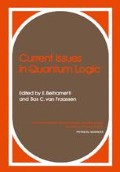Abstract
In this paper we discuss the relation between commutativity and transition probability in quantum mechanics based on Hilbert space. To depict this relation, we shall use the framework of axiomatic quantum mechanics, leading to an orthomudular lattice corresponding to the lattice of closed subspaces of a Hilbert space and called the logic of quantum mechanics.1, 6 In Hilbert space quantum mechanics, if ϕ and ψ are unit vectors representing pure states, then (ϕ, ψ) is interpreted as the probability of transition between the states ψ and ϕ. On the other hand, if P ϕ and P ψ are two projection operators onto the subspaces generated by the vectors ϕ and ψ, respectively, then the commutativity or non-commutativity of P ϕ and P ψ is clearly connected with the transition probability between the states ϕ and ψ, which are eigenstates of P ϕ and P ψ , respectively. In general, two observables represented by self-adjoint operators A and B commute if they have common eigenvectors (for simplicity, we speak only of observables with pure point spectrum). If they do not commute, there is at least one pair ϕ, ψ of two eigenvectors, ϕ being an eigenstate of A and not B, and ψ being an eigenstate of B but not A, and during interchanging measurements of A and B there is a positive probability of transition between ϕ and ψ. Hence we see that if we wish to introduce the measure of non-commutativity, this measure should be related to transition probability.
Access this chapter
Tax calculation will be finalised at checkout
Purchases are for personal use only
Preview
Unable to display preview. Download preview PDF.
References
G. Birkhoff and J. von Neumann, Annals of Math. 37 (1936), p. 832.
V. Cantoni, Commun. Math. Phys. 44 (1975), p. 125.
A.M. Gleason, J. of Rat. Mech. and Anal. 6 (1967), p. 885.
S. Gudder, Some unsolved problems in quantum logics, in “ Mathematical Foundations of Quantum Theory”, Academic Press, New York (1978).
T. Kato, “Perturbation Theory for Linear Operators”, Springer, Berlin-Heidelberg-New York (1966).
G. Mackey, “The Mathematical Foundations of Quantum Mechanics” W.A. Benjamin, New York (1963).
M.J. Maczynski, Bull. Acad. Polon. Sci. Ser. Sci. Math. Astron. Phys., (submitted for publication).
J. von Neumann, “Functional Operators II. The Geometry of Orthogonal Spaces”, Princeton University Press, Princeton, (195).
E. Prugovecki, “Quantum Mechanics in Hilbert Space”, Academic Press, New York (1971).
Author information
Authors and Affiliations
Editor information
Editors and Affiliations
Rights and permissions
Copyright information
© 1981 Plenum Press, New York
About this chapter
Cite this chapter
Maczyński, M.J. (1981). Commutativity and Generalized Transition Probability in Quantum Logic. In: Beltrametti, E.G., van Fraassen, B.C. (eds) Current Issues in Quantum Logic. Springer, Boston, MA. https://doi.org/10.1007/978-1-4613-3228-2_23
Download citation
DOI: https://doi.org/10.1007/978-1-4613-3228-2_23
Publisher Name: Springer, Boston, MA
Print ISBN: 978-1-4613-3230-5
Online ISBN: 978-1-4613-3228-2
eBook Packages: Springer Book Archive

